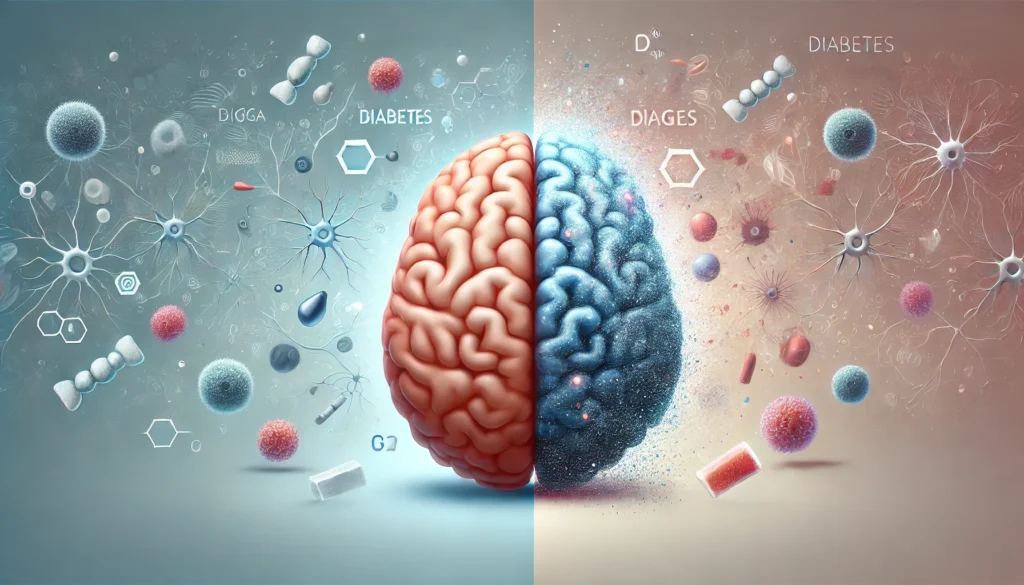Diabetes is a chronic metabolic disorder that affects millions of people worldwide. While it is widely recognized for its impact on blood sugar regulation and complications affecting the heart, kidneys, and eyes, an equally critical yet often overlooked aspect of diabetes is its effect on the brain. Research has increasingly highlighted the connection between diabetes and cognitive decline, with mounting evidence suggesting that diabetes can contribute to memory loss and increase the risk of dementia. This article delves into the intricate relationship between diabetes and brain health, exploring the mechanisms through which diabetes impacts cognitive function, the potential reversibility of diabetes-related memory loss, and strategies for mitigating cognitive decline in diabetic individuals.
You may also like: How Diabetes Affects the Brain: Understanding Brain Fog, Memory Loss, and Mental Confusion from High Blood Sugar
The Connection Between Diabetes and Brain Health
The human brain is an energy-intensive organ that relies heavily on glucose for optimal function. Insulin, the hormone responsible for regulating blood sugar levels, plays a crucial role in facilitating the uptake of glucose by brain cells. In individuals with diabetes, insulin resistance or insufficient insulin production can disrupt this process, leading to a cascade of neurological effects. Studies indicate that chronic hyperglycemia and insulin resistance may contribute to cognitive dysfunction by promoting inflammation, oxidative stress, and vascular damage within the brain. Over time, these pathological changes can impair memory, learning, and overall cognitive function.
The link between diabetes and cognitive impairment is supported by epidemiological studies showing that individuals with diabetes are at a higher risk of developing dementia, including Alzheimer’s disease. The term “Alzheimer en diabetes” is gaining prominence in medical literature, reflecting the growing recognition of diabetes as a potential contributor to Alzheimer’s pathology. While the exact mechanisms remain under investigation, researchers hypothesize that insulin resistance within the brain, often referred to as “type 3 diabetes,” may play a pivotal role in the development of Alzheimer’s disease.

Can Diabetes Cause Dementia? Understanding the Mechanisms
One of the most pressing questions in the medical community is whether diabetes directly causes dementia or merely exacerbates pre-existing vulnerabilities. While diabetes alone may not be the sole cause of dementia, several underlying mechanisms link these conditions. Chronic hyperglycemia, a hallmark of diabetes, is known to damage small blood vessels in the brain, leading to reduced oxygen supply and neuronal degeneration. This condition, known as diabetic cerebrovascular disease, can result in vascular dementia, a common form of dementia characterized by impaired blood flow to the brain.
Additionally, insulin resistance in the brain can disrupt the clearance of beta-amyloid plaques, a pathological hallmark of Alzheimer’s disease. Beta-amyloid accumulation is associated with neuroinflammation and synaptic dysfunction, contributing to the progressive memory loss observed in Alzheimer’s patients. The phrase “does diabetes cause dementia” is often explored in scientific literature, with studies indicating that diabetes significantly increases the risk of developing Alzheimer’s and other forms of dementia by as much as 50%.
Another key factor linking diabetes to cognitive decline is neuroinflammation. Elevated blood sugar levels can trigger an inflammatory response in the brain, leading to the activation of microglia, the brain’s immune cells. Chronic neuroinflammation is associated with accelerated brain aging and an increased risk of neurodegenerative diseases. The interplay between diabetes, inflammation, and neurodegeneration underscores the importance of managing blood sugar levels to preserve cognitive health.
Is Diabetes-Related Memory Loss Reversible?
A crucial concern for individuals experiencing diabetes-related cognitive decline is whether memory loss associated with diabetes can be reversed. While complete reversal may not always be possible, emerging research suggests that proactive management of diabetes can lead to cognitive improvements and slow the progression of memory impairment. The concept of “diabetes memory loss reversible” is gaining traction, as studies indicate that lifestyle modifications, glucose control, and targeted interventions can have a significant impact on brain health.
One promising area of research is the effect of glycemic control on cognitive function. Studies have demonstrated that improved blood sugar management, achieved through diet, exercise, and medication, can enhance cognitive performance and reduce the risk of dementia. For instance, individuals who achieve better glycemic control often report improvements in memory, attention, and executive function. This reinforces the importance of maintaining stable blood sugar levels to support brain health.
Moreover, interventions such as cognitive training, regular physical activity, and a nutrient-rich diet can play a crucial role in preserving cognitive function. Exercise, in particular, has been shown to enhance insulin sensitivity, reduce inflammation, and promote neurogenesis, the process by which new neurons are formed. By adopting a holistic approach to diabetes management, individuals can potentially mitigate cognitive decline and improve their overall quality of life.
Strategies for Protecting Brain Health in Diabetic Individuals
Given the strong association between diabetes and cognitive impairment, it is imperative for individuals with diabetes to take proactive steps to protect their brain health. Several evidence-based strategies can help mitigate the impact of diabetes on cognitive function and reduce the risk of dementia.
First and foremost, maintaining optimal blood sugar control is essential. Fluctuations in blood glucose levels can exacerbate cognitive decline, making it crucial for diabetic individuals to monitor their glucose levels regularly and adhere to prescribed treatment plans. A diet rich in whole foods, healthy fats, and lean proteins can help stabilize blood sugar levels and provide essential nutrients for brain function.
Physical activity is another powerful tool for preserving cognitive health. Regular exercise has been shown to improve insulin sensitivity, enhance blood flow to the brain, and promote the release of brain-derived neurotrophic factor (BDNF), a protein that supports neuronal growth and repair. Activities such as walking, swimming, and strength training can be particularly beneficial for individuals with diabetes.
Additionally, cognitive stimulation and lifelong learning can help build cognitive resilience. Engaging in activities that challenge the brain, such as reading, puzzles, and learning new skills, can strengthen neural connections and enhance cognitive function. Social engagement is equally important, as maintaining strong social connections has been linked to a lower risk of dementia.

Frequently Asked Questions About Diabetes and Cognitive Health
1. How does long-term diabetes influence brain aging beyond typical memory concerns?
Long-term diabetes accelerates brain aging through chronic inflammation, vascular damage, and insulin resistance in the brain. While memory loss and diabetes are often discussed in relation to blood sugar spikes, emerging evidence shows that persistent hyperglycemia impairs neuroplasticity and reduces hippocampal volume. This means the brain’s ability to form new memories and adapt to change is biologically compromised. These effects may occur even in individuals with well-managed diabetes, making it essential to consider cognitive assessments part of routine diabetes care. Addressing memory loss and diabetes proactively with cognitive therapy, physical activity, and dietary support may delay age-related decline and protect brain function into later decades of life.
2. Can early signs of dementia in diabetic patients be misdiagnosed or overlooked?
Yes, early cognitive changes linked to dementia and diabetes are often subtle and mistaken for stress, depression, or medication side effects. Common symptoms like forgetfulness, disorientation, or difficulty with problem-solving can be masked by fluctuations in blood glucose. Moreover, many primary care visits focus on metabolic markers rather than cognitive screening, leading to underdiagnosis of early dementia and diabetes interactions. Understanding how diabetes memory affects executive function may help clinicians differentiate between reversible cognitive dips and the progressive nature of dementia. Patients and caregivers should be educated to recognize early red flags, especially when they coincide with erratic glycemic patterns.
3. What’s the link between insulin resistance in the brain and Alzheimer’s disease?
Research suggests that insulin resistance in the brain—sometimes referred to as “type 3 diabetes”—plays a pivotal role in the connection between Alzheimer en diabetes. Insulin is not only crucial for blood sugar regulation but also for signaling processes in the brain related to memory and learning. When brain cells become less responsive to insulin, it disrupts energy use, leading to oxidative stress and amyloid plaque accumulation—hallmarks of Alzheimer’s. This connection between Alzheimer en diabetes is currently a hot topic in neuroendocrinology, with trials investigating whether diabetes medications like GLP-1 receptor agonists can mitigate early cognitive impairment. Understanding this bidirectional relationship provides a more nuanced view of how chronic metabolic disease contributes to neurodegeneration.
4. Are lifestyle interventions effective in preventing cognitive decline in diabetics?
Yes, lifestyle interventions can be highly effective in slowing or preventing cognitive decline, especially when initiated early. Addressing both diabetes memory loss and cardiovascular risk factors through diet, sleep hygiene, and exercise has shown promising results in preserving brain health. Cognitive training, social engagement, and omega-3 supplementation may also enhance synaptic function. The potential for diabetes memory loss reversible outcomes is greatest in cases where metabolic control is combined with neuroprotective habits. Studies like the Finnish Geriatric Intervention Study (FINGER) underscore that multifactorial lifestyle changes can help offset the cognitive risks associated with diabetes, making prevention a practical and empowering strategy.
5. What role do blood sugar fluctuations play in short-term memory lapses?
Short-term blood sugar variability can have an immediate impact on brain function. Both hypoglycemia and hyperglycemia may lead to transient confusion, poor attention, and disorientation—hallmarks of diabetes memory dysfunction. These fluctuations may not directly result in permanent damage, but chronic exposure increases vulnerability to long-term decline. For individuals experiencing repeated episodes, memory loss and diabetes management should include continuous glucose monitoring and individualized glycemic targets. Over time, reducing glycemic variability may support better memory retention and lower the likelihood of progressing to more serious cognitive disorders.
6. Can diabetes cause dementia even in individuals without other risk factors?
Emerging data suggest that yes, diabetes can cause dementia even in the absence of classic risk factors like smoking, hypertension, or family history. The link is not merely correlational—there is increasing mechanistic evidence showing how insulin resistance and microvascular damage impair neuronal function. This raises the critical question: does diabetes cause dementia through a unique neuroendocrine pathway or simply exacerbate preexisting vulnerabilities? While the answer likely involves both, the fact that diabetes can cause dementia in otherwise low-risk individuals underscores the importance of early cognitive screening and metabolic intervention.
7. Is diabetes-related cognitive decline always permanent?
Not necessarily. In some cases, diabetes memory loss reversible outcomes are achievable, especially when caused by medication mismanagement, nutrient deficiencies, or poorly controlled blood sugar. If identified early, cognitive deficits tied to diabetes memory dysfunction may improve through tighter glycemic control, B12 supplementation, or adjustments in pharmacotherapy. However, once structural changes occur—such as brain atrophy or vascular damage—the cognitive decline may become irreversible. The key is distinguishing between temporary cognitive impairment and the onset of irreversible conditions like dementia and diabetes-related neurodegeneration. Early intervention makes a critical difference in outcomes.
8. How can caregivers support a loved one facing both diabetes and early dementia?
Caregivers play a vital role in managing the intersection of dementia and diabetes. From monitoring blood sugar and ensuring medication adherence to recognizing signs of cognitive distress, their support can significantly improve quality of life. Using reminders, pill organizers, and consistent routines helps minimize errors that could worsen both conditions. Since alzheimer en diabetes often coexist in older adults, caregivers should be trained in both dementia care techniques and diabetic emergency protocols. Emotional support and respite care are also essential, as caregivers for patients dealing with dementia and diabetes frequently experience high levels of burnout and anxiety.
9. Are there specific nutrients or supplements that protect against diabetes-related memory decline?
Yes, several nutrients have shown potential in supporting brain health in diabetics. Omega-3 fatty acids, magnesium, and B vitamins—especially B6, B9 (folate), and B12—are linked to better outcomes in diabetes memory preservation. These nutrients may help counteract the oxidative stress and inflammation associated with chronic hyperglycemia. Additionally, flavonoid-rich foods like berries and dark chocolate have been associated with improved cognition and vascular health. While they are not a cure, these dietary elements can complement efforts to reduce memory loss and diabetes-related complications when used alongside medical treatment and lifestyle changes.
10. What are future directions in research around diabetes and cognitive disorders?
Future research is increasingly focused on personalized medicine and neuroprotective strategies. Scientists are exploring how genetic profiles influence the way memory loss and diabetes interact, paving the way for targeted interventions. Clinical trials are also investigating whether certain diabetes drugs—like metformin or GLP-1 agonists—can delay or prevent cognitive decline. Wearable tech and AI-powered cognitive screening tools may offer early detection of diabetes memory deterioration before it becomes clinically evident. As the connection between alzheimer en diabetes becomes clearer, we can expect more integrated approaches in both prevention and treatment, grounded in individualized risk profiles and real-time data tracking.

Conclusion: The Future of Diabetes and Brain Health Research
As research continues to uncover the intricate relationship between diabetes and cognitive decline, it is clear that diabetes management must extend beyond blood sugar control to include brain health preservation. The association between “memory loss and diabetes,” “dementia and diabetes,” and “Alzheimer en diabetes” underscores the need for a comprehensive approach to diabetes care that prioritizes cognitive well-being.
While the question “can diabetes cause dementia” remains a subject of ongoing research, the evidence strongly suggests that diabetes is a significant risk factor for cognitive impairment. However, the concept of “diabetes memory loss reversible” offers hope, as studies indicate that proactive lifestyle interventions can slow or even improve cognitive decline in diabetic individuals.
By adopting a multidimensional approach that includes glycemic control, physical activity, cognitive engagement, and a brain-healthy diet, individuals with diabetes can take meaningful steps to protect their cognitive function. As medical advancements continue to emerge, future research may uncover novel therapies and preventive measures to further mitigate the impact of diabetes on brain health, ultimately improving the lives of millions affected by this complex condition.
brain health and diabetes, cognitive decline and blood sugar, insulin resistance and memory loss, neuroinflammation and diabetes, vascular dementia and diabetes, type 3 diabetes and Alzheimer’s, blood sugar fluctuations and cognition, diabetic cerebrovascular disease, hyperglycemia and brain aging, insulin sensitivity and cognitive function, exercise and brain health, memory loss prevention in diabetes, nutrition for brain health, Alzheimer’s prevention strategies, cognitive training and diabetes, metabolic health and dementia risk, brain fog and diabetes, inflammation and neurodegeneration, diabetes-related neurodegenerative disorders, lifestyle interventions for cognitive health
Further Reading:
Type 2 Diabetes, Cognition, and Dementia in Older Adults: Toward a Precision Health Approach
Cognitive decline and dementia in diabetes mellitus: mechanisms and clinical implications
What is the link between diabetes and dementia?
Disclaimer: The content published on Better Nutrition News (https://betternutritionnews.com) is for informational and educational purposes only. It is not intended as a substitute for professional medical advice, diagnosis, or treatment. Always seek the guidance of a qualified healthcare professional before making any changes to your diet, nutrition, or wellness practices. The opinions expressed by authors and contributors are their own and do not necessarily reflect those of Better Nutrition News.
Better Nutrition News and its affiliates make no representations or warranties regarding the accuracy, completeness, or reliability of the information provided. We disclaim all liability for any loss, injury, or damage resulting from the use or reliance on the content published on this site. External links are provided for reference purposes only and do not imply endorsement.



